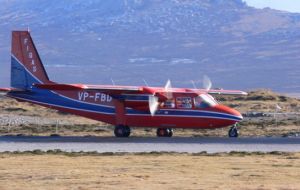MercoPress. South Atlantic News Agency
Islanders' manufacturer Britten Norman, expanding its new aircraft final assembly plant
 The Falkland Islands Air Service, FIGAS, has a fleet of several BN2 series Islanders for domestic flights and fisheries air patrolling.
The Falkland Islands Air Service, FIGAS, has a fleet of several BN2 series Islanders for domestic flights and fisheries air patrolling. Omani-owned UK aircraft manufacturer Britten Norman has signed leases on two additional hangars at its Solent Airport base, on the south coast of England. Airport owner Fareham Borough Council has recently built several new hangars at the site to expand its business park.
The expansion adds 13,000 sq ft and will be used for “a new aircraft final assembly plant,” along with aircraft refurbishment, MRO services, international field servicing, and specialist avionics and mission system integration.
Meanwhile, the expansion will allow the company's BN Defense subsidiary to use the existing facilities “to expand output to meet increased demand in the military MRO sector,” said the company, which builds a military version of the Islander called the Defender 4000.
The Falkland Islands Air Service, FIGAS, has a fleet of several BN2 series Islanders for domestic flights and fisheries air patrolling.
A controlling majority interest in Britten-Norman was acquired by Oman's Zawawi, a family-owned investment group, in 2001.
Britten-Norman CEO William Hynett earlier this month outlined the current status of the company and its ambitions. Hynett said his taking the reins of the company in 2003 was to “make it work or close the company,” but with UK government work, some from Pakistan, “a couple of private sales,” and a couple of aircraft for Nepal—which were gifted by the UK government—the firm was able to survive.
Then a contract from the UK MoD linked to Iraq “catapulted us into a fleet build and then a midlife update––that kept us really busy until 2010.”
Having managed to survive the 2008 financial crisis, the company looked to support Islander operators around the world. Hynett estimates that approximately two-thirds of the 1,300 Islanders built remain in operation.
While it is only manufacturing a deliberately conservative total of four new airframes a year (with an order book for a couple of years), upgrading and modifying aircraft has provided a rich seam of work—and the company is actively interested in acquiring aircraft also for upgrading. The new aircraft now have Garmin 600 cockpits as standard, so this is offered as a retrofit.
Hynett is confident, mainly because “there is nothing directly comparable [to the Islander] available,” and he didn't balk at a comparison with ATR and how it has revolutionized the prospects of its 50/70-seat turboprop airliners. Islanders typically seat 10 (or eight in its luxury cabin with club-four seating). The closest aircraft to an Islander is the Twin Otter, and while that aircraft is ideal for 45 to 60-minute flights, Islanders are ideal for 20 to 30-minute hops in passenger service.
The company also recently established a base in Malta, mainly for training. “It's not about Brexit,” said Hynett. “Weather is a factor in terms of training and they're very easy to work with there. And Armed Force Malta operate our aircraft.”
Hynett said he recently ferried an aircraft to the Falkland Islands as part of its fleet upgrade. For a former Fleet Air Arm Harrier pilot, it was still challenging. (PN)

Top Comments
Disclaimer & comment rules-

Read all commentsI didn't realise they had moved out of Bembridge (where they were also true Islanders) but I guess that the Fleet Air Arm and a former RN air station as a base makes a lot of sense. Funny how the choice of location of a company is often shaped by the preference of the boss.
Feb 22nd, 2019 - 11:26 am 0Commenting for this story is now closed.
If you have a Facebook account, become a fan and comment on our Facebook Page!